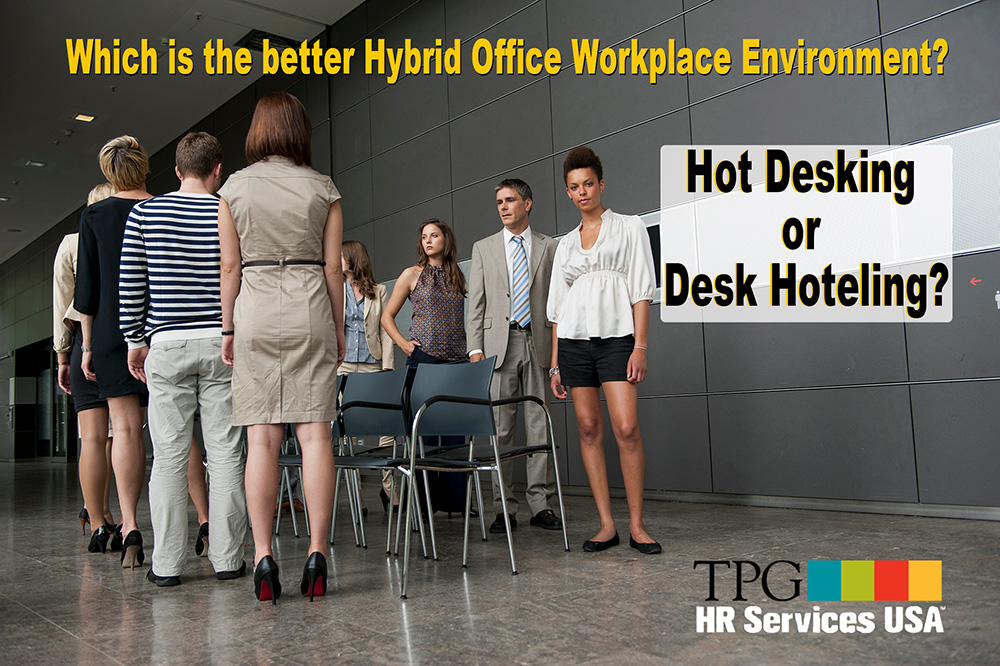
Hot Desking vs Desk Hoteling: Which is the Better Hybrid Office Workplace Environment?

Ms. Pomerantz is the CEO of TPG HR Services USA and has over 35 years of Human Resources practices experience. She holds a Master’s in Human Resource Management (MHRM) and is a certified Senior Professional in Human Resources (SPHR) and SHRM Senior Certified Professional (SHRM-SCP). Mary also serves as CEO of Mary Pomerantz Advertising, one of the largest recruitment advertising agencies in the country. Earlier in her career, she was president of the 17th largest staffing firm in the country.

As a result of the COVID-19 pandemic, more and more companies have transitioned to hybrid office workplace environments, and this shift seems likely to remain in place in some form even after the current health crisis has passed. Many of these hybrid work arrangements involve employees spending some of their time working remotely and some of their time working in the office. In recognition of the possible semi-permanence of this change, some companies have begun to adjust their company real estate holdings to match their reduced need for physical workspace for all their staff. These companies must then decide how to best allocate their shared desks amongst their rotating workers. To address this new hybrid office workplace challenge companies will usually adopt either a “hot desking” or “desk hoteling” solution.
What’s the difference between hot desking and desk hoteling?
While both hot desking and desk hoteling are both based on some form of desk sharing (no traditional fixed desk), they differ significantly in their implementation. A hot desking office workplace environment is based on the principle of first-come, first-served. The first-come, first-served hot desk approach is the easiest to implement logistically because there is no actual scheduling system. At the same time, this also creates many different types of potential problems if more employees show up at any given time than there are available workstations.
Conversely, workplace environments that choose the desk hoteling approach use a reservation type of system to schedule and allocate each of their work desks. The name hoteling comes from the familiar process used whenever someone books a hotel room. Each employee must “book” (reserve) a workstation in advance before they come into the office to ensure there will be an available desk for them to work on when they get there. Similar to an actual hotel reservation system, the hoteling approach requires the creation of some sort of scheduling system, usually done online, to ensure that employees’ visits to the office are properly “booked” before they arrive on site.
A simple analogy that highlights the difference between hot desking and desk hoteling is to think of attending any type of music or entertainment concert or event. Some people prefer to arrange for a reserved seat to be waiting for them, and some people come to the event knowing it is first come, first serve so they better get there early so it is not standing room only. [1]

The potential chaos of first-come, first-served hot desking
First-come, first-served hot desking can very easily degenerate into a free-for-all where employees may show up to work and find that there is not any available workspace for them in which to work. This would be an incredible waste of employee productivity and probably impact employee morale in a negative way. Employees may feel they need to arrive at work early than everyone else to “grab a spot” before their co-workers. At first, this may sound like something employers might like the idea and they would definitely choose hot desking to encourage their employees to come in early. But the risk they run is if employees simply choose not to go into the office entirely out of fear there are no available workstations to use if they don’t come to work early. The hot desking approach is most challenging during peak business periods when project deadlines are approaching, or specific business priorities must be accomplished.[1]
Most Common Cited Disadvantages of Hot Desking:
- Sending the message that employees don’t matter
- Interrupting on-the-job training
- Difficulties finding key people or asking for help
- Impromptu team meetings take longer to assemble
[2]
The comparative advantages of desk hoteling
The desk hoteling approach to managing a hybrid office workplace, however, does deliver on the productivity and morale-boosting promise of the hybrid work concept. Desk hoteling gives workers the flexibility to schedule their in-office time to make the most productive use of it. Whether employees are scheduling their office time on a purely personal basis to fit their own needs and preferences or scheduling time as teams or small workgroups to allow for collaboration on projects – hoteling enables employees to utilize time in the office as well as specific office resources (such as meeting rooms or lab space, etc.) in the ways that work best for them and their teams. This process can also help companies define which office resources are most in-demand and which might be reduced to save on real estate costs are simply make the most productive use of existing space. [1]

How a hybrid office workplace environment can enhance your company’s bottom line
Some companies who have employed a hybrid office workplace environment using the desk hoteling model, have seen employee productivity increase, morale improve and even higher profits compared to their previous traditional office workplace environment. Part of the reason for the higher profits in these companies is a result of divesting themselves of expensive real estate holdings or rental expenses. In addition, freed from having to have an office or desk specifically designated for each employee, companies can reimagine their workspaces to include more features that could encourage greater and more effective employee collaboration. Ultimately the goal of a hybrid office workplace should be to maximize the productive use of every square foot of office space. [1]
TPG HR Services can help you with your decision and implementation of a hybrid office workplace
Hybrid work environments, particularly those using the desk hoteling model, can be a very effective element of your company’s success. However, there are many tips and techniques to make sure that you implement this concept in the best possible way to enhance your company’s unique strengths and capabilities. When you choose to partner with TPG HR Services we can advise you of all the options available for your company and help you to design a system that aligns best with your company’s unique needs. We know that every company’s workforce has its own specific strengths and challenges. TPG HR Services can help you create a hybrid office workplace that works for your specific organization and assist you in getting everything to run smoothly and efficiently.
